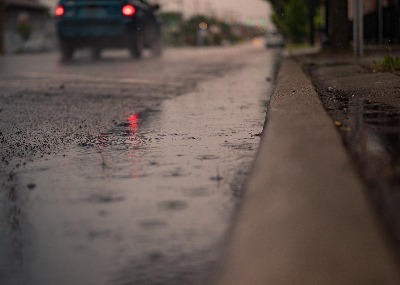Wet Weather Tyres
Heavy rainfall can cause large pools of water to collect in dips or crevices on road. This isn't good for motorists who may be unaware that their tyres have submerged in water.
Tread on normal tyres may not be able to disperse the water quickly, leading the vehicle to aquaplane or spin out of control.
Here at Tyre Shopper, we stock a range of wet weather tyres online, designed specially to alleviate this situation.

How do wet weather tyres work?
If too much surface water builds up, normal tyres can lose grasp of the road, affecting both braking and steering, which can be dangerous.
Wet weather tyres are designed to perform well in damp and rainy conditions, by ensuring that water is evacuated from the tyre surface as quickly as possible.
Special deep grooves in the tread pattern allow these tyres to remain in contact with the road, gripping it effectively while the risk of aquaplaning is substantially minimised.
How can you tell if tyres are suitable for wet weather?
Tyre labelling which now appears by European law on all new passenger tyres includes a rating for wet braking distances.
Tyres are graded A - G. 'A' tyres are the best performers with the shortest wet braking distances.
'G' tyres have the longest braking distances. However, driving performance isn’t just about having the right wet weather tyres - it’s also about tyre maintenance and how you drive.
Driving in wet weather
Besides your tyres, there are ways you can ensure you stay safe whilst driving in rainy conditions.
Check tyre pressure
Tyres should be properly inflated and in good condition to ensure they perform well. New tyres with 8mm of tread have a braking distance 10metres shorter than tyres which are down to the legal minimum.
Having tyres properly inflated means you will have less chance of aquaplaning. You should check tyre pressure before each long trip, or at least every three weeks.
Keep safe distance
Slow down and remember to keep your distance from the car in front in wet weather.
A safe distance helps lower your chance of an accident, especially when braking distances increase.
Another top tip is to avoid puddles and try to follow the tracks of a driver ahead of you.
Know how to recover from a skid
If you do skid on a wet road, don't panic and most importantly, don't slam on the brakes. If you have an anti-lock braking system (ABS) be careful not to pump the brake pedals.
Instead, apply firm steady pressure and although it may feel unnatural, steer in the direction of the skid.
Are all-season tyres good in the rain?
All-season tyres will provide a good level of grip in the rain. The deep grooves will help prevent aquaplaning, by dispersing any excess water through the grooves, and therefore prevent any loss of control.
All-season tyres won’t perform as well as wet weather tyres though, as all-season tyres are designed to be used in any condition, and therefore aren’t specifically designed for driving in the rain.
Which tyres are best to prevent aquaplaning?
Wet weather tyres will give you the best protection against aquaplaning. Deep grooves, will prevent any water from clogging the tyre, therefore leading to more control. When a car aquaplanes, it is due to the tyre not being able to disperse the water, meaning that it has less grip due to less contact with the road.
Wet weather tyres ensure that water doesn’t stay within the grooves or on the surface of the tyre, therefore giving maximum control in wet conditions.
Book online
Frequently asked questions
Wet weather tyres could be used all year round, but you will suffer a loss in performance when driving in dry conditions. Wet weather tyres will provide less traction in the dry, due to their tread pattern. This will lead to less grip and could harm your fuel efficiency, due to an increase in rolling resistance.
Wet weather tyres will wear quicker if used in dry conditions. The tyre compound is designed to be used in wet conditions, which are typically cooler in temperature. If used in dry conditions, the wet weather tyre could overheat, and therefore wear quicker.
Winter tyres share similar deep grooves to wet weather tyres, and therefore will be more efficient at dispersing water than all-season tyres. However, if temperatures are above 7 degrees Celcius, winter tyres should not be used as they will suffer from a lack of grip, due to the tyre compound.
We're here to help
Obviously, if you want to avoid an accident when the rainy weather hits, browse our wet weather tyres online today and we'll find a special offer to suit you, as we cater for all budgets.
If you'd like more information about cold weather tyres, head to our winter tyres page.
If you can't choose between Goodyear tyres and another of our world-renowned brands, our experts are available to help you.
Find your local FITTING centre or MOBILE fitting service
